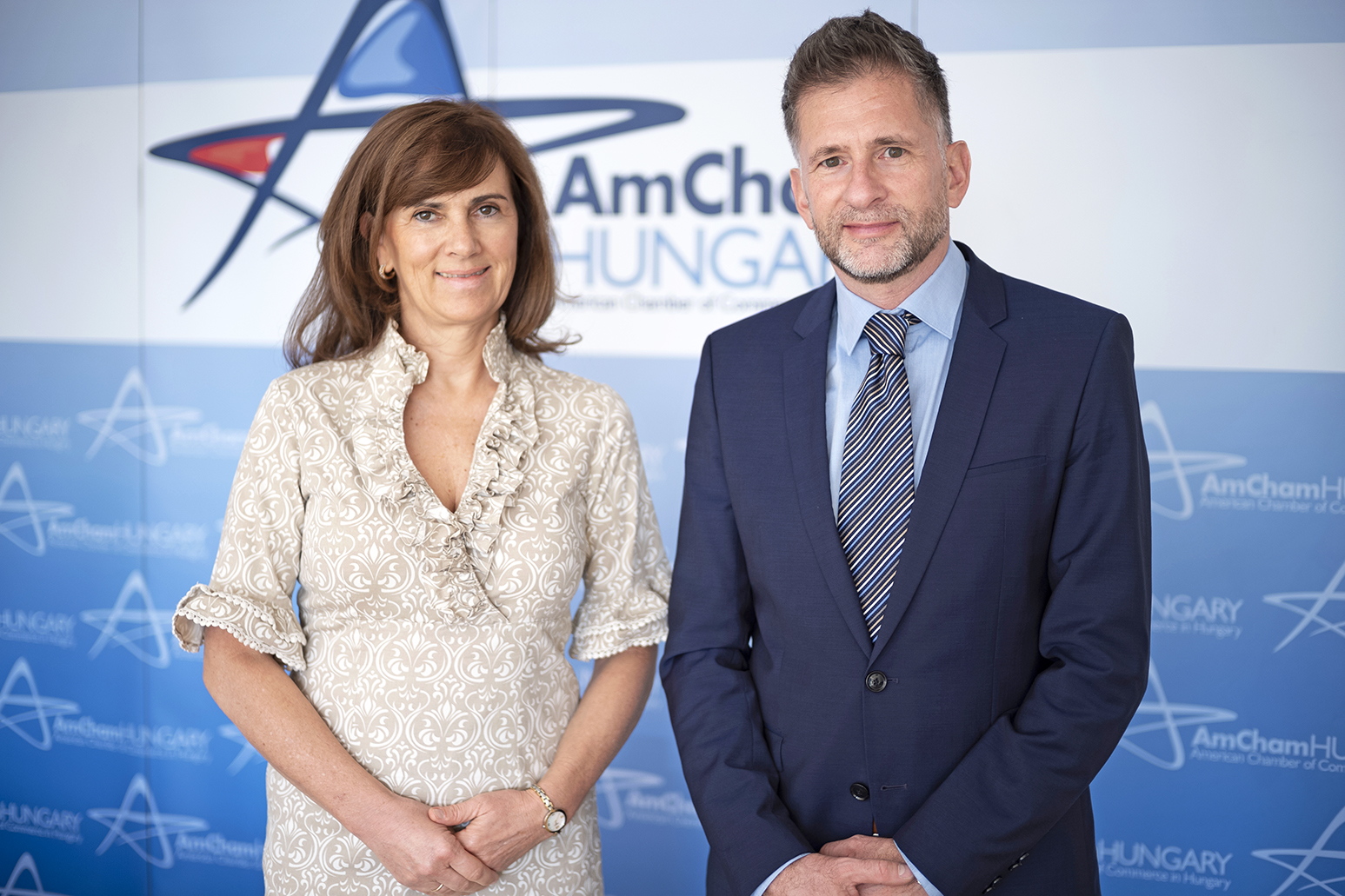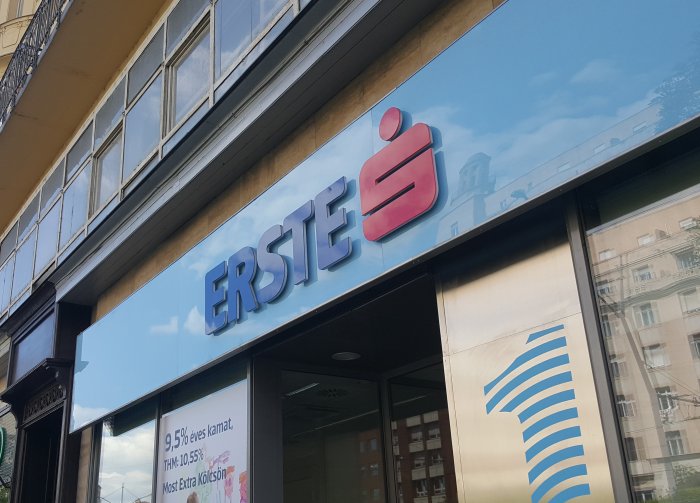AmCham: Building Relevance by Adding Value

AmCham CEO Írisz Lippai-Nagy and president Zoltán Szabó.
The American Chamber of Commerce in Hungary has been the guardian of the U.S. business ethos in this country for 30 years, but are those values still relevant today? The Budapest Business Journal sat down with AmCham’s president and CEO to discuss this and much else besides.
BBJ: As the leading business organization advocating for and representing the interest of U.S. businesses in Hungary, what are the key areas where AmCham is talking to the government?
Írisz Lippai-Nagy: Maintaining a dialogue with the government to represent the interests of our membership and improve the country’s competitiveness is part of our mission and has long been on our agenda. Lately, we have formulated positions and sent them to the government on three major policy areas: Education, healthcare and taxation. On education, we highlight the need to modernize public education, whereas in healthcare, we talk about the need for a predictable business environment for life science companies. We are proud that our positions were supported by several other international chambers of commerce, further enhancing the voice of AmCham.
Zoltán Szabó: On taxation, AmCham has stressed the importance of negotiations for a new U.S.-Hungarian Double Taxation Treaty. Furthermore, we sent a position letter on windfall taxes to critical policymakers about the harmful economic effects of an unpredictable business environment, focusing on tax increases on innovative pharmaceuticals. We look forward to discussing the issues further with the respective decision-makers at our Business Forums planned for the autumn.
BBJ: Do you see any movement on the replacement double-taxation treaty?
Írisz Lippai-Nagy: Since the U.S. announced the termination of the treaty in July 2022, AmCham has emphasized the importance of the renewal or to start negotiating on the possibilities of a new convention on several platforms (Business Forums, position letters, in meetings, and through interviews) and engaged in a dialogue with both the U.S. and Hungarian decisions makers. However, the existing convention will be phased out from January 2024 as we have already passed the date when it could have been renewed. Laying the foundations of a new agreement takes several years, based on previous practice. Therefore, we must face the reality of no agreement for at least a specific period. Next year there will be a presidential election in the United States, which we cannot ignore; that could also affect the treaty’s future.
Zoltán Szabó: Negotiating a new treaty now appears to be a relatively long-term goal. However, the absence of a treaty could be a disadvantage in several respects, such as the country’s international reputation, especially from a business perspective. From next year, Hungary would be the only European country without an agreement in force. Furthermore, the absence of such a treaty could increase uncertainty about Hungary as an investment destination. We will keep the issue on the agenda and strive for discussions with both sides. The absence of the treaty will also impact Hungarian investments in the States and individuals who have assets there.
BBJ: What are the main challenges faced by U.S. businesses in Hungary?
Írisz Lippai-Nagy: The biggest challenge is the unpredictable economic and regulatory environment. A company can only perform well, especially in the medium- and long-term, if it can prepare and plan ahead, which requires a certain level of stability. Regarding the U.S.-Hungarian Tax Treaty, its absence may also create uncertainty among investors as, without it, they might see Hungary as a place where a special tax, i.e., a withholding tax, could be levied on income paid from the country at any time, which could jeopardize the return on investment.
Zoltán Szabó: This could lead to further adverse effects such as a contraction or absence of investments or a shift of business service functions to other countries. In addition, it also entails additional taxes and potentially administrative burdens for American citizens working in Hungary since American-sourced income also becomes taxable in Hungary. Moreover, if an American parent company wishes to grant shares or stock options to employees working in Hungary, the benefits might be subject to a 30% U.S. withholding tax.
BBJ: Certain elements of the Hungarian media seem pretty hostile to U.S. Ambassador David Pressman. Does this undermine the bilateral relationship?
Zoltán Szabó: We are fortunate to have an excellent and close working relationship with the Ambassador and discussions are under way to welcome him to AmCham in the fall. We have been working closely with the embassy and the U.S. Chamber of Commerce for years, and, despite recent global challenges, the numbers suggest a robust bilateral business relationship. Currently, nearly 1,700 U.S.-based companies are operating in Hungary, employing around 106,000 people. Our aim at AmCham Hungary is to improve the country’s competitiveness, including business competitiveness, to ensure that bilateral relations can be maintained in the upcoming years.
BBJ: AmCham Hungary CEO Írisz Lippai-Nagy, a member of the AmChams in Europe network, participated at the ACE annual conference in the United States in May. How important is this network, and what came from the trip to the States?
Írisz Lippai-Nagy: With a presence in 44 countries, ACE is the largest network of international chambers of commerce in Europe and celebrates its 60th anniversary this year. ACE operates as a cross-country support network that represents added value to the AmChams and our members. There is an AmCham in almost every European country, where international member companies can register their local subsidiary, ensuring they can receive practical support from their chamber with comprehensive knowledge of local business specifics. Regarding the trip and the key takeaways, the conference provided an excellent opportunity for cross-chamber best-practice sharing and knowledge exchange. Furthermore, the meeting pointed out that, in today’s challenging world, it is essential to have a unified voice focusing on transatlantic relations and the timeless values that apply to all of us, regardless of our country of origin.
BBJ: Are American values still recognized and welcomed in Hungary, or is the country, with its “Opening to the East” policy, drifting away from the U.S. sphere?
Zoltán Szabó: There is undoubtedly an opening towards the East, but at the same time, as a European country, Hungary holds Western and American values that have become part of our culture over the years, including our business culture. Values such as diversity, equality, integrity, transparency, and partnerships all respond to the expectations of today’s generations and point toward progress, so they must stay with us for the long term. Our business community stands by them, and we hope their example will motivate other companies and citizens of this country.
BBJ: Aside from the embassy and ACE, do you work with other U.S. organizations?
Írisz Lippai-Nagy: We strive to cooperate with partners in Hungary and America. Our main partners in this regard are the American-Hungarian Chamber of Commerce and the U.S.-Hungary Business Council. The first is present in the States and mainly offers support to Hungarian companies wishing to enter the U.S. market; the other is a platform connecting Hungarian government leaders and U.S. business executives, who can then support the Hungarian subsidiary of their company through partnerships and information developed with the help of the council. We also collaborate with the Hungarian Investment Promotion Agency, which can support U.S. companies by introducing investment opportunities here in Hungary.
This article was first published in the Budapest Business Journal print issue of July 14, 2023.
SUPPORT THE BUDAPEST BUSINESS JOURNAL
Producing journalism that is worthy of the name is a costly business. For 27 years, the publishers, editors and reporters of the Budapest Business Journal have striven to bring you business news that works, information that you can trust, that is factual, accurate and presented without fear or favor.
Newspaper organizations across the globe have struggled to find a business model that allows them to continue to excel, without compromising their ability to perform. Most recently, some have experimented with the idea of involving their most important stakeholders, their readers.
We would like to offer that same opportunity to our readers. We would like to invite you to help us deliver the quality business journalism you require. Hit our Support the BBJ button and you can choose the how much and how often you send us your contributions.










